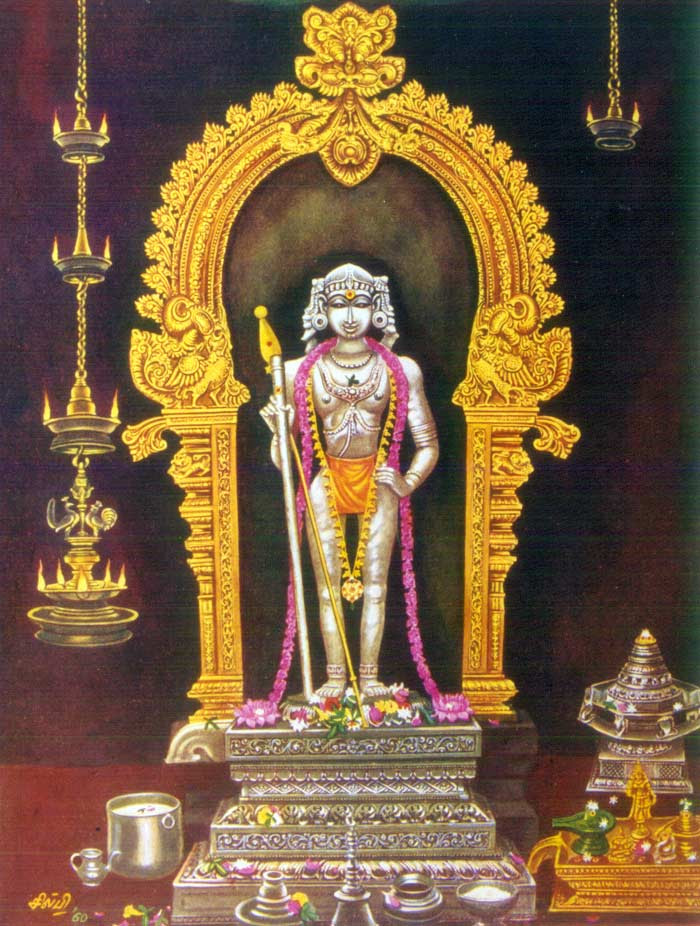
While Sri Arunagirinathar weaved many garlands of songs (Paamalai) and offered them to different manifestations of God, Bhagavan Sri Ramana Maharshi made a garland of letters (Aksharamana Malai) and offered them to Lord Arunachala. While Arunagirinathar rendered over 16,000 songs in eloquent verses of Thiruppugazh, Bhagavan Sri Ramana Maharshi remained in silence most of the time. While the author of Kandhar Anubhuti was born at Tiruvannamalai and visited all over the land, the author of Aksharamana Malai came over to Tiiruvannamalai and never moved from there.
Though the garland of songs weaved by Sri Arunagirinathar came in different colours and though the garland of letters weaved by Sri Ramana Maharshi came few centuries later, we find that the thread that bound those garlands remains one. Though the songs were composed differently they were united in their goal and though the songs were composed at different times, they converged at the same end; liberation from the repeated cycle of life birth and death. In fact, the devotee finds many common grounds in Thiruppugazh and Aksharamana Malai to pursue his spiritual goal.
What the devotee who pursues his spiritual goal needs first is the grace, the grace that comes from Guru. It is the Guru who dispels his illusion and guides him to the way of truth. While concluding Kandhar Anubhuti, Arunagirinathar prays: “Oh! Muruga, come as my Guru and bestow me your benign grace.” (Guruvai Varuvai Arulvai Guhane). Bhagavan Sri Ramana Maharshi also says: “Oh! Arunachala, come as my Guru and remove all impurities like ego from my mind and radiate the light of your grace to me”. (Kutramutru aruthenai…A.M.Malai 19)
The term, ‘Summa Iru’ (remain quiet) is not a state of idleness. It means remaining in a state free from the concepts of body and mind. It is a state equal to Samadhi when the individual remains true to himself, free from mental thoughts and physical action. Lord Muruga appeared before Arunagirinathar and initiated him to sainthood by giving the advice. The essence of this advice was ‘Summa Iru’ (remain silent) which Arunagirinathar revealed in his hymn Kandhar Anubhuti. “When the Lord commanded me to remain still and silent, I could not comprehend the truth behind those great words.” (Summa Iru Sollara Enralume Amma Porul Onrum Arinthilane (Kandar Anubuti 12). Bhagavan also indicates the same advice given to him by Arunachala. “Oh! Arunachala” said Maharshi in Akshara Mana Malai “quiet you remained, not uttering any word, as if signalling the message of silence.” (Sollathu Solli Nee Sol Ara Nillenru Summa Irundhai Arunachala). “In the ocean of bliss that flows through my heart, where words, mind and feelings all subside, Oh! Arunachala, come and remain there quiet,” Bhagavan says in another verse (Sugakadal ponga..31). We find that Bhagavan has used, on his own, the same word, “Summa Iru”, which Sri Arunagirinathar employed in his Kandhar Anubhuti.
Adi Sankara says: “When a man of ignorance, having neither the discrimination nor detachment, goes after sense-objects, he becomes the sad victim of his delusion and meets his end. (Viveka Chudamani 76). We go by what we see with our external eye, not realizing that the eyes are deceiving us, just as we mistake the mirage in the desert for water. Similarly, we go by the senses and get attracted to the illusionary images of the world. The senses thus rob our vision, our real identity and our peace. Arunagirinathar says: “Oh! Mind, abandon the desires that arise out of the five senses of mouth, eye, nose, ear and tongue, abandon the path that leads you to the wrong act of Karmas and elevate yourself to the higher state to experience the grace of Muruga” (Kaivai Kadirvel….. Kandhar Anubhuti 14) In the song rendered at Tiruchendur, Arunagirinathar says: “Let me go beyond the realm of day and night, break away from the sorrows caused by Indriyas and remain singing the glory of your Lotus Feet.” (Andhakan varum dhinam). He further says: “The five sense elements would not allow me to worship you by offering flowers nor would they allow me to reach your Lotus Feet” (Ora ottar onrai unna ottar, malar ittu unathu thaal”…Kandhar Alamgaram 4). Bhagavan Sri Ramana Maharshi compares the senses to thieves. Thieves are those who come from outside, sneak into our house, grab precious articles and run away. The outside thieves who come and go are better than the thieves who come from within and deprive the devotee of his precious knowledge. Bhagavan says: “Oh Arunachala, when the five thieves (senses) enter into my mind to rob me, would you not be there to drive them out?” (Aimbula kalvan akathinil pukunthu…(Aksharamana Malai..11)
Though the ‘I’ refers to the pure Consciousness, which prevails at all times, the mind projects a false notion of ‘I’ (ego) and the individual mistakes this false ‘I’ as real. There is only one ‘I’, the pure ‘I-Consciousness’, but the false ‘I’, projected by the mind, parades itself as the ‘I’ and associates itself with objects and functions (‘I am the body’). Bhagavan Sri Ramana Maharshi says: “Oh Lord Arunachala, remove my false notion of ‘I’ and guide me to realize my Self which is not different from you. Arunagirinathar also says “You have seized my individuality and as a result, I have become one with you”. (Yaan aakiya ennai vizhungi, verum thanai nilai ninrathu tharparame…Anubhuti 28).
In the midst of some diversity, we find an amazing light of unity in the two works. Kandhar Anubhuti consisting of 51 verses of Jnana came from Sri Arunagirinathar, who was a devotee first and, Aksharamana Malai consisting of 108 verses of devotion came from Thiruchuzhi Nathar, who was a Jnani. This goes to show that the path of knowledge (Jnana) and the path of devotion (bhakti) converge at the same end; realization.